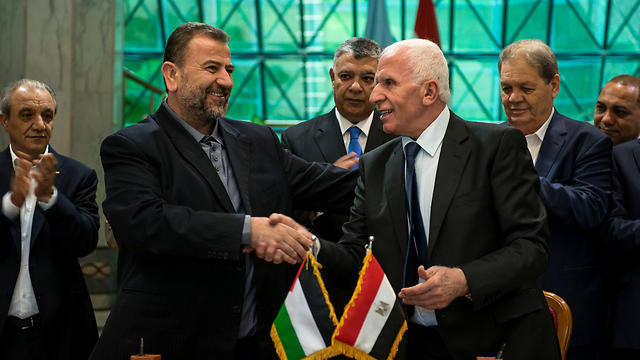There are a thousand and one reasons—all good and justified—to reject out of hand the reconciliation agreement between Fatah and Hamas.
After all, Hamas has not changed its ways: it tunnel digging continues and it is still trying to launch terror attacks, while the Palestinian Authority continues funding terrorism and promoting incitement. Furthermore, the unification with Hamas would only radicalize the PA. Yet, despite all of these reasons, Israel should welcome the agreement.
Because we've already been here: In 2006, Hamas won the elections in the Palestinian Authority. Following the blow Fatah suffered, Saudi Arabia came into the picture and in 2007 mediated an agreement between the two warring factions, which was dubbed the "Mecca Agreement."
The Quartet—an international forum made up of the United States, Russia, the European Union and the United Nations—decided that to continue receiving aid, the new Palestinian government, including Hamas, must meet three conditions: Recognize Israel, put an end to terror attacks, and honor previous agreements signed between Israel and the Palestinians. The UN Security Council adopted the Quartet's conditions, but Hamas never accepted them.
In any case, the Mecca Agreement only lasted several months, until Hamas took over the Gaza Strip in June 2007.
Now, Israel is facing a new compromise agreement between Fatah and Hamas. The last thing Israel needs is more declarations that would make it appear intransigent and extreme while the Palestinians seemingly—only seemingly—are trying to present unity that would allow for negotiations.
After all, one of Israel's excuses for the freeze in peace negotiations has been the division in the Palestinian camp. Now, however, there is one Palestinian entity. It's possible it would only last several weeks or months, but until then—this is a unified Palestinian entity.
Israel doesn't have to do much. It just needs to adopt the Quartet conditions, and make it clear its positions are no different than those of the international community. If the unified Palestinian Authority wants legitimization, it needs to also accept the Quartet's conditions.
And for the PA to not become another Lebanon—meaning, a civil government in a country in which the strongest body is one faction's militia or terror organization—Israel should accept what the European Union has already proposed: Demilitarization in return for the lifting of the blockade on the Gaza Strip. Only then should Israel cooperate with the PA and allow forces from the West Bank to enter the strip.
What is clear is that Israel should not be seen as one wishing to sabotage the reconciliation agreement. On the contrary, this is an agreement reached under the auspices of Egypt, and Egypt is Israel's strategic partner in the fight against jihad and Iran.
Precisely in such circumstances, a smart response to the Palestinian unity agreement—which includes a generous proposal concerning the Gaza Strip—will put Israel in a position from which it would only stand to benefit.
If the Palestinians reject the proposal, Israel could say Hamas was and remains part of global jihad, that it has no interest in reaching a compromise with Israel, and that it has taken the Palestinian Authority hostage.
If the Palestinians say yes, it would be an historic turning point that would decrease the chances of another conflict in the south. And that is a lot to gain.



















